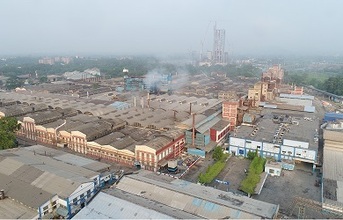
Dalmia-OCL Ltd has launched a new refractory line for production of Magnesia Carbon (MgO-C bricks) at its Rajgangpur plant in Odisha. Minister of State for Steel, Faggan Singh Kulaste inaugurated the production line, which will have a capacity of 108,000 tonne and cater to the demand of domestic steel manufacturers.
Once fully commissioned, this will be India's largest refractory line for production of Magnesia Carbon Bricks and promises to cut nation's import dependence by up to 50%. The refractory line, which has been set up under Dalmia-OCL's initiative of ‘Bharat ki Factory mein Bharat ki Refractory', will come up in 3 phases of 36,000 tonne each. This product is widely consumed by the steel industry and most of the current demand (approximately 300,000 tonne annually) is met through imports.
Under this initiative, Dalmia-OCL - a Dalmia Bharat Group company - is localizing the production of most refractories to provide support to its key customers such as SAIL, Tata Steel, JSW Group, JSPL Group, AMNS etc. With the launch of the new manufacturing line, the company aims to substitute imports with locally manufactured MgO-C bricks and expects to capture 25 percent market share. Subsequently, the company plans to export these bricks to Europe and other key steel markets across the globe. The company has made a cumulative investment of Rs 50 crore in the past 2 years and expects its total refractory business to grow by 50% in the next 5 years.
Further, Dalmia-OCL plans to make a cumulative investment of another Rs 100 crore in the next five years to boost its domestic manufacturing capacity and align itself to India's vision to become a 300 million tonne steel manufacturing nation by the end of this decade.
Speaking on this occasion, Faggan Singh Kulaste, Union Minister of State, Ministry of Steel said, "To achieve Hon'ble Prime Minister's vision of Atmanirbhar Bharat, industries across sectors need to strengthen their manufacturing capabilities in order to reduce our dependency on imports. Today, the steel industry's capacity is 142 million tonne for which almost 1.2 million tonne of refractory is required and almost 30 percent of refractories is imported. It is therefore imperative to enhance refractory production in India to decrease our dependency on imports and become self-sufficient. National Steel Policy 2017 has set a target of achieving 300 million ton steel capacity by 2030-31 and this will increase demand for domestic refractories. I congratulate Dalmia-OCL for the new Magnesia Carbon Line and hope they will further set up more refractory lines in order to cater to the steel industry and realise the vision of truly Atmanirbhar Bharat. At the same time, it is also critical that the entire steel industry comes together to realise the dream of Atmanirbhar Bharat by buying only from the Indian manufacturers and start to reduce their dependence on imports."
Sameer Nagpal, CEO, Dalmia-OCL said, "Truly committed to a self-reliant India under Hon PM Narendra Modi Ji's vision for ‘Atmanirbhar Bharat', Dalmia-OCL has embarked upon its key initiative of ‘Bharat ki Factory mein Bharat ki Refractory'. It gives me immense pleasure to state that the Magnesia Carbon Line is India's first refractory line post the announcement of Atmanirbhar Bharat initiative."
"Under this new line we will be putting up capacity of 108,000 tonne in MgO-C brick in our Rajgangpur plant in Odisha and will be commissioning it in three phases of 36,000 tonne each. The first phase inaugurated today will play a pivotal role in substituting imports from China. We have thus started the process of shielding our steel makers from vagaries and fluctuations of global markets. Going forward, we will be further strengthening our manufacturing capabilities to not only make India ‘Atmanirbhar' but also a major export hub," Nagpal added.
Contributing to the Steel industry's Atmanirbharta mission, investments in a new monolithic line in Katni and Snorkel line in Rajgangpur are already helping the Indian industry to use locally made products in their factories. Taking a leap from here, the company plans to further strengthen the refractory business in India, hence, shaping the future of the Indian Refractory Industry.
END
